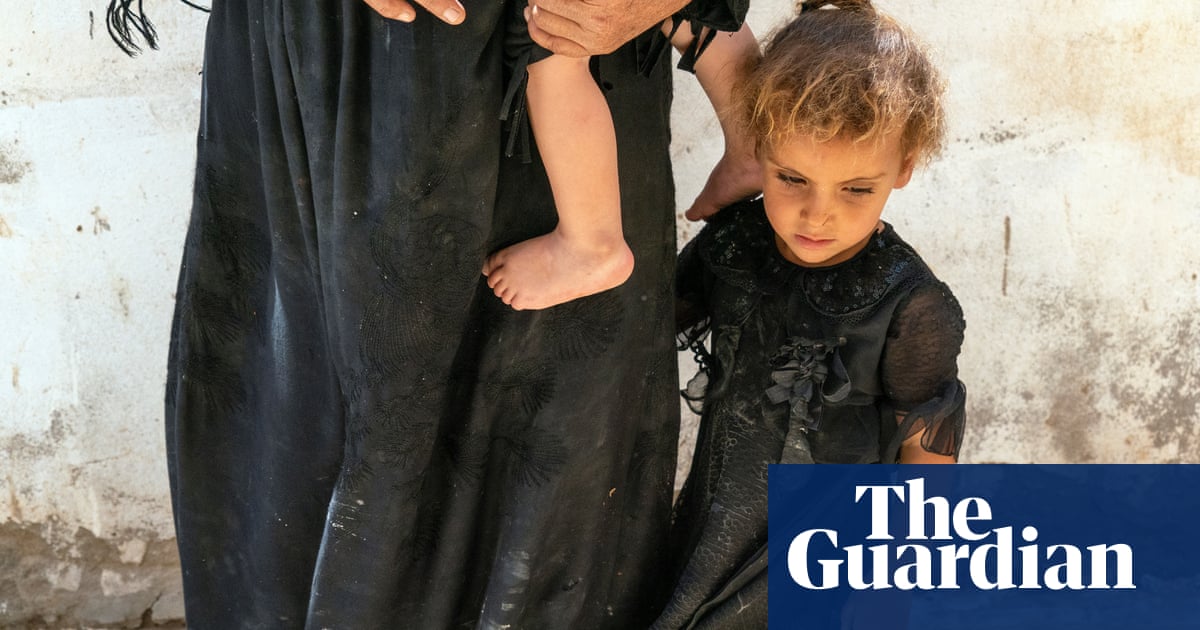
Where the Tigris and Euphrates rivers meet, the Hawizeh marshes have been populated for more than 5,000 years, most recently by the Marsh Arabs, who have thrived on planting, fishing and hunting. But prolonged droughts and elevated temperatures, as well as dams built upstream in Turkey and Iran, have left this unique landscape with little water.
Marshland has been reduced to shallow streams, and without enough water to sustain their livelihoods, many Marsh Arabs have left the area, moving to the fringes of cities to try to build new lives.
Some of the smokestacks of the Iraqi oil industry form a backdrop to the catastrophic condition of the once biodiverse marshes.
Abdul Walid Abdul, 50, stares out the window of his house in Al Musharrah. Abdul and his wife, Layla Jabar Hassan, 45, are Marsh Arabs whose family for generations lived off the rice and vegetables they grew in the Hawizeh marshes, as well as the buffalo they raised. It was ‘like heaven,’ Abdul says. The family could earn 1m dinars (£550) with each harvest. But when the water dried up the trees started dying. ‘Now there is no more farming. I have had to stop it all. As there is no rain or water it is impossible to farm,’ Abdul says.
Abdul Walid Abdul’s family left their farm and headed to the town of Al Musharrah in search of work. They live on the outskirts in poor housing.
Abdul now works as a guard at an abandoned water recycling project run by the government. He earns 400,000 dinars a month. ‘Now they control us. They pay us a salary, but we have lost our freedom. But we need to do this and however it feels, we need to thank God for everything.’
Abdul’s family struggles, as do his neighbours, pictured here. ‘We were like kings before, we had green land, so many trees,’ he says. ‘But now it’s so different. We are even less respected than before.’
Layla Jabar Hassan, Abdul’s wife, misses life on the farm. ‘We never realised we could be in this situation,’ she says. ‘We used to be so strong. We felt important then. Here we are not.’ For the first time she has a paid job as a school housekeeper. It has long been a taboo for women from the Marsh Arabs community to work outside the home. She earns 500,000 dinars a month – more than her husband.
Hassan says she likes working. It has brought her a new sense of identity and changed her outlook on life. ‘It is good, it gives me a purpose,’ she says. ‘The children in the school need to be taught and taken care of. Even if I feel tired, I know I am helping the children build their future. I feel so happy doing this work. I now think girls should get their own jobs.’
Abdullah Khalid, 66, in his home in Abu Khasib, just outside Basra. An Arab language teacher at the Madrassa El Alam, Khalid has experienced the impact of the climate crisis in his classroom and on his farm. His land has dried up, while his classrooms overflow with the children of farmers who have had to migrate. Classes that used to have 25 students now often have 85. ‘How can we deal with this as teachers?’ he says. ‘It is stressful, but we can’t just leave these children.’
Khalid’s son, Hamid, 13, displays the cover of his maths book. There are 85 pupils in his class. ‘Many students on one desk – four instead of two,’ he says. ‘When the teacher starts to explain something it can be hard to even hear. I like my studies but it has become more difficult to learn. I feel sad because I have to be more responsible for my success, but I feel pressured. Maybe I can still achieve my ambitions. I hope so.’
Zeinab Haida, 45, works at a market stall in Al Musharrah. She says the land where she used to live is now ‘like a desert’. She lives with her seven children and has to work to support the family as her husband is sick. ‘I am forced to do this job,’ she says. ‘If I just sit in this house there is no food. There is no other solution.’
Satar Jabar, 52, can be seen reflected in the mirror set in the tree. He is unable to work so relies on his son to support the family. He doesn’t allow his wife to work. The family rent a house outside Al Musharrah town for 200,000 dinars a month. ‘The marshes are like heaven,’ he says. ‘We felt like kings, so if we needed anything we just got it. People from the city would come visit our land to take a rest and breathe fresh air. Now it is the opposite. Some people are very depressed moving to the city. There is no work , no food.’
Jabar’s son, Ahmed, 24, has. managed to get a day’s work hauling construction materials in Al Musharrah town; he will earn around 10,000 dinars. Work is hard to find. ‘When life was good in the marshes, people would came to us at our home and offer us work,’ he says. ‘We just laughed and smiled at them. “Why do we need these jobs?” we said, “for we are happy on our land, we have everything”. We didn’t think the situation would ever be like this - we didn’t think we would ever need their jobs. We are disappointed to be the first generation in this life.’
Satar Jabar’s neighbour, Karim Khrair, 65, stands beside the boat he keeps in the hope he will be able to use it again when he returns to the marshes.
Ghalib Ammon, 50, is one of the last farmers to leave the marshes. He has spent his whole life here, fishing and raising water buffalo, just as his family has done for years. ‘I am about to leave along with everyone else,’ he says, pointing to pools of water on a reed-rimmed expanse of dry land. A handful of water buffalo lazily make their way across. ‘Every summer is hotter than the one before and there is not nearly as much rain as before.’
‘The lack of water is destroying agriculture and fishing,’ says Ammon. ‘When the water buffalo have water, they produce 30 litres of milk. Without water, it’s only 10. If this year doesn’t get any more rain, I doubt anyone will be here next year.’












